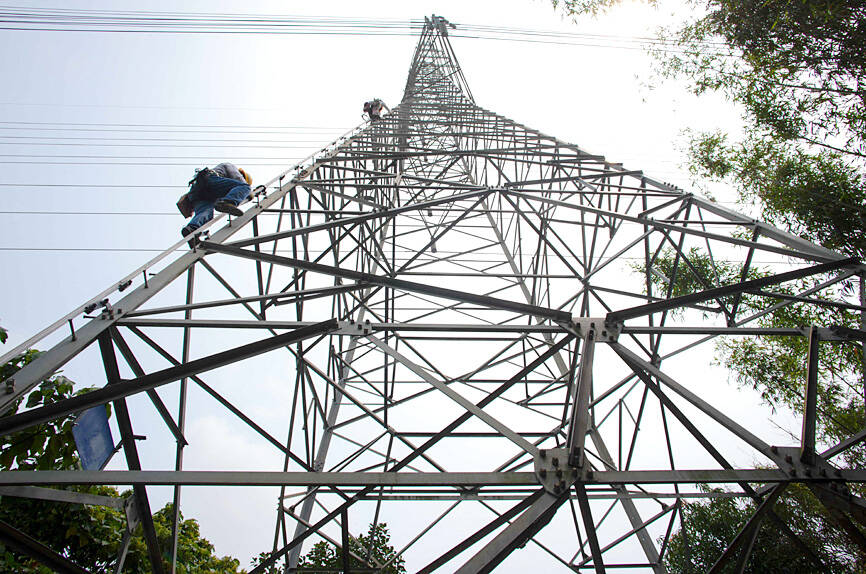Major trade groups yesterday called on incoming economics and finance ministers to prioritize ensuring stable electricity supply and power rates to make Taiwan a business-friendly nation.
The Third Wednesday Club and the Chinese National Association of Industry and Commerce (CNAIC, 工商協進會) made the remarks after premier-designate Cho Jung-tai (卓榮泰) on Tuesday revealed his choice of Topco Group (崇越集團) chairman J.W. Kuo (郭智輝) as minister of economic affairs.
Cho also appointed insurance professor Peng Jin-lung (彭金隆) to steer the Financial Supervisory Commission, former PricewaterhouseCoopers Business Consulting Services Taiwan chairman Paul Liu (劉鏡清) as minister of the National Development Council and academic Wu Cheng-wen (吳誠文) as minister of the National Science and Technology Council.

Photo: Sam Yeh, AFP
“We’re glad to see entrepreneurs and academics in the new administration and look forward to their contributions to Taiwan’s economic development,” said Lin Por-fong (林伯豐), chairman of the Third Wednesday Club, whose membership is limited to the top 100 firms in individual sectors.
Lin said he hopes president-elect William Lai (賴清德) would halt electricity rate adjustments after he assumes office on May 20 so that businesses can breathe a sigh of relief following an 11 percent increase in rates on average this month.
The government should strive for GDP growth of more than 3.5 percent this year, better than the 3.2 percent uptick for the global economy projected by the IMF, Lin said.
The most urgent task for the government is to ensure that electricity supply is stable and affordable, Lin said.
Two unexpected blackouts on Tuesday afternoon hit about 10,000 households in Taoyuan and New Taipei City, following a power capacity strain on Monday.
The April 3 earthquake affected a power plant in Hualien County and the rise in temperatures put pressure on overall power supply, Taiwan Power Co (台電) said.
Lin said the government should revisit the nation’s energy mix by ditching the plan to phase out nuclear power plants and raising the share of nuclear power to 30 percent from about 10 percent.
Artificial intelligence services and applications require data centers, high-capacity servers and high-performance computing chips, all of which consume large amounts of electricity, he said.
The government could extend the services of Guosheng Nuclear Power Plant in Wanli District (萬里), New Taipei City, and Ma-anshan Nuclear Power Plant, in Ma-anshan (馬鞍山), Pingtung County, and build new ones with top-class safety standards, he added.
Pegatron Corp (和碩) chairman Tung Tzu-hsien (童子賢) told an economic forum that nations with computing power advantages and sufficient electricity capacity would emerge victorious in the AI era.
CNAIC chairman Thomas Wu (吳東亮) applauded the incoming Cabinet’s emphasis on technology and financial innovations among other things.
Ministers-designate should talk with trade groups to gain better understanding of their needs and views, Wu said.
Most sectors have called for relaxed labor rules and imports of foreign workers to solve human resources shortages, he said.
Only two of the 15 new appointments in Cho’s Cabinet are female and the CNAIC would like to see more female ministers for the sake of gender equality, he added.
More than 20 Cabinet posts are still to be named.

Three experts in the high technology industry have said that US President Donald Trump’s pledge to impose higher tariffs on Taiwanese semiconductors is part of an effort to force Taiwan Semiconductor Manufacturing Co (TSMC, 台積電) to the negotiating table. In a speech to Republicans on Jan. 27, Trump said he intends to impose tariffs on Taiwan to bring chip production to the US. “The incentive is going to be they’re not going to want to pay a 25, 50 or even a 100 percent tax,” he said. Darson Chiu (邱達生), an economics professor at Taichung-based Tunghai University and director-general of

‘LEGACY CHIPS’: Chinese companies have dramatically increased mature chip production capacity, but the West’s drive for secure supply chains offers a lifeline for Taiwan When Powerchip Technology Corp (力晶科技) entered a deal with the eastern Chinese city of Hefei in 2015 to set up a new chip foundry, it hoped the move would help provide better access to the promising Chinese market. However, nine years later, that Chinese foundry, Nexchip Semiconductor Corp (合晶集成), has become one of its biggest rivals in the legacy chip space, leveraging steep discounts after Beijing’s localization call forced Powerchip to give up the once-lucrative business making integrated circuits for Chinese flat panels. Nexchip is among Chinese foundries quickly winning market share in the crucial US$56.3 billion industry of so-called legacy

Taiwan Semiconductor Manufacturing Co (TSMC, 台積電) yesterday held its first board of directors meeting in the US, at which it did not unveil any new US investments despite mounting tariff threats from US President Donald Trump. Trump has threatened to impose 100 percent tariffs on Taiwan-made chips, prompting market speculation that TSMC might consider boosting its chip capacity in the US or ramping up production of advanced chips such as those using a 2-nanometer technology process at its Arizona fabs ahead of schedule. Speculation also swirled that the chipmaker might consider building its own advanced packaging capacity in the US as part

A move by US President Donald Trump to slap a 25 percent tariff on all steel imports is expected to place Taiwan-made steel, which already has a 25 percent tariff, on an equal footing, the Taiwan Steel & Iron Industries Association said yesterday. Speaking with CNA, association chairman Hwang Chien-chih (黃建智) said such an equal footing is expected to boost Taiwan’s competitive edge against other countries in the US market, describing the tariffs as "positive" for Taiwanese steel exporters. On Monday, Trump signed two executive orders imposing the new metal tariffs on imported steel and aluminum with no exceptions and exemptions, effective